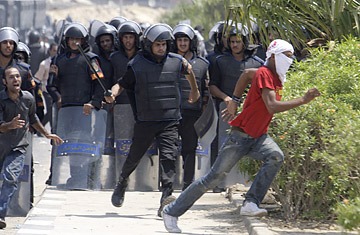
An Egyptian protester, right, runs away from a policeman chasing him in Cairo, Egypt on August 15, 2011.
The protesters from both sides complained that Egypt's Central Security Forces were doing what they do best: standing passively by in thick cordons, armed with shields and batons, and watching a violent clash between supporters and opponents of Hosni Mubarak. Earlier, police had simply watched as men amassed piles of rocks for the impending battle over the fate of the ousted president. And when they finally, sporadically, interfered in the melee, they ferociously beat random people. "It's a reflection of the urgent need to reform everything to do with the riot police," says Heba Morayef, a researcher with Human Rights Watch. "Basically they don't know how to do crowd control."
Monday's crowd clashed outside the courtroom where Mubarak and his Interior Minister Habib al-Adly are being tried on charges of ordering violence against protesters during the winter uprising. If convicted, each could face the death penalty. But the scenes outside on the street are an uncomfortable reminder that each man's abuses may run deeper than those committed during the so-called revolution. "The process has been rubbish," says Morayef, on the court's failure to investigate regime crimes that pre-date the uprising. "And it will not expose the most serious legacy of Mubarak's time, which, for me, is torture. Under Mubarak torture shifted from being a tool that was used against political detainees to being the average investigative method."
The new head of the security service's training division, Brigadier General Asser Nigm al-Din is painfully aware of the problem. Speaking from his office at State Security headquarters in the north Cairo neighborhood of Nasr City, he says stringent new exams that include an IQ test, and questions to gauge "social intelligence" are part of his efforts to solve it. But reforming the most feared institution of the dictator's reign may prove more difficult even than convicting Mubarak himself. Behind the batons and shields of Egypt's black-clad riot police lurked State Security, Mubarak's vast internal spy agency that in recent decades came to symbolize the regime's worst abuses.
"State security is part of the Ministry of the Interior. But due to expansion of its tasks, it became like a separate service," explains al-Din. The service tapped phones. It kept tabs on on politicians, journalists and civil society figures. Its plainclothes officers lurked on the streets, tasked with daily intelligence collection. Opposition groups often accused the service of employing thugs to intimidate voters during elections. And many former prisoners claim that it was in State Security custody that they suffered the worst torture.
State Security represented to many Egyptians what the Stasi had been to East Germans, and just weeks after Mubarak stepped down, protesters overran the service's Nasr City headquarters, and found thousands of intimate files, some of which contained humiliating details of their own private lives, or plans to destroy the reputations of opposition leaders. The resulting public outrage led interim Prime Minister Essam Sharaf to pledge an overhaul. "I pray that Egypt will be a free country and that its security apparatus will serve the citizens," he told thousands who had gathered in Tahrir Square.
State Security was immediately dismantled; its officers placed under the authority of the Interior Ministry headed by a new minister. Six months later, says al-DIn, the domestic spy agency is doing its best. Admittedly, its staff hasn't changed much. Many of "the people who used to work in the field" have simply been reassigned to other police-related post. The rest returned to jobs at headquarters of the service that was tactfully renamed "National Security" — the name change, al-Din smiles, "was one of the demands of the public."
And despite the Interior Ministry proclaiming a new era of transparency and political neutrality, its operations remain almost entirely opaque. Rights groups complain about new plans by State Security to investigate civil society groups.
